Report: Foundation of Workplace Success - University Name
VerifiedAdded on 2021/06/17
|8
|1642
|42
Report
AI Summary
This report provides a comprehensive overview of the foundations of workplace success, emphasizing the importance of effective business communication, including social media, telephone conversations, written communication, facial expressions, and verbal communication. It delves into the principles of effective self-management, covering time management, prioritization, organization, understanding one's role, focus, and setting deadlines. Furthermore, the report highlights strategies for improving self-management skills, particularly negotiation skills, and the value of preparation and mentorship. The report also includes a bibliography of cited sources.
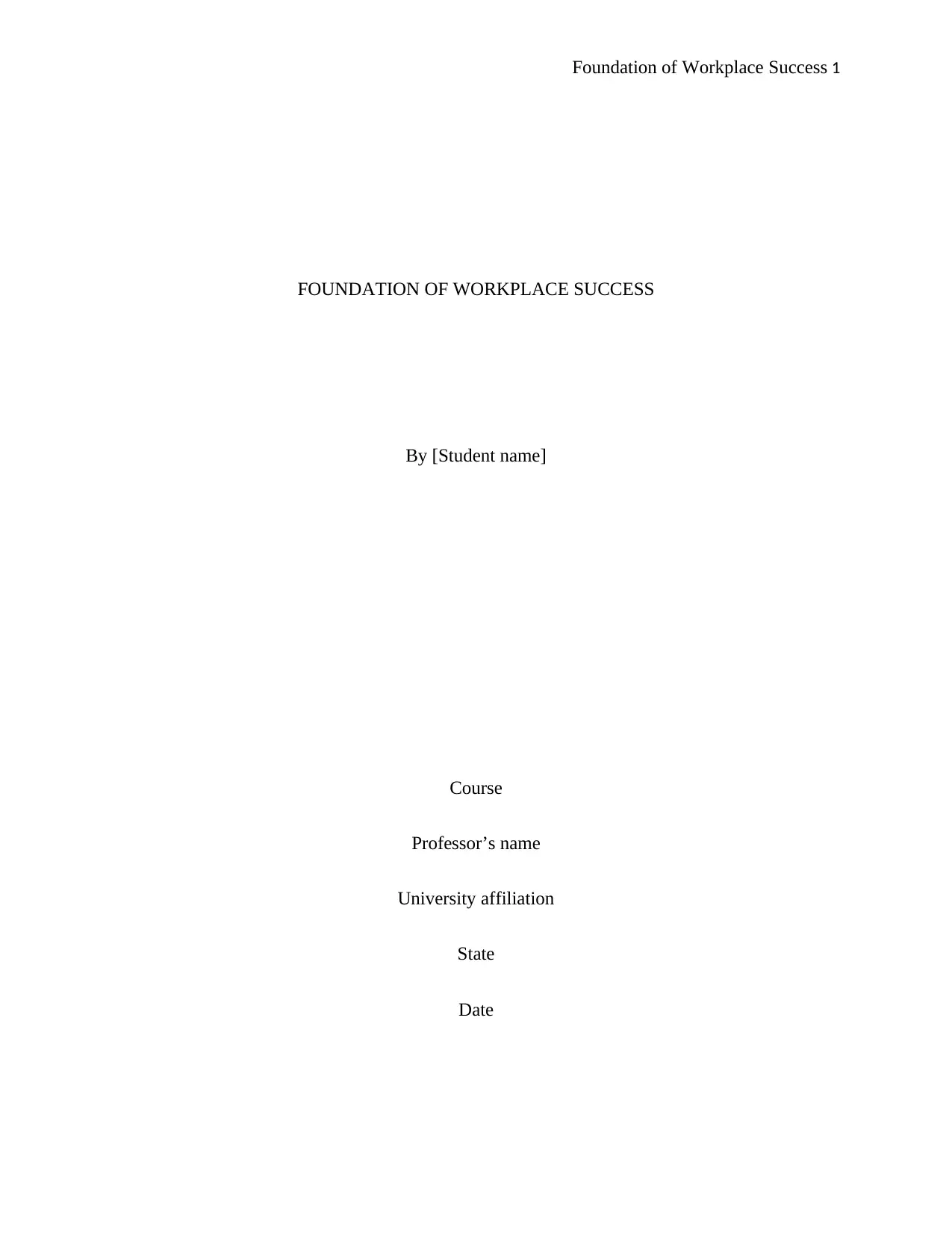
Foundation of Workplace Success 1
FOUNDATION OF WORKPLACE SUCCESS
By [Student name]
Course
Professor’s name
University affiliation
State
Date
FOUNDATION OF WORKPLACE SUCCESS
By [Student name]
Course
Professor’s name
University affiliation
State
Date
Paraphrase This Document
Need a fresh take? Get an instant paraphrase of this document with our AI Paraphraser
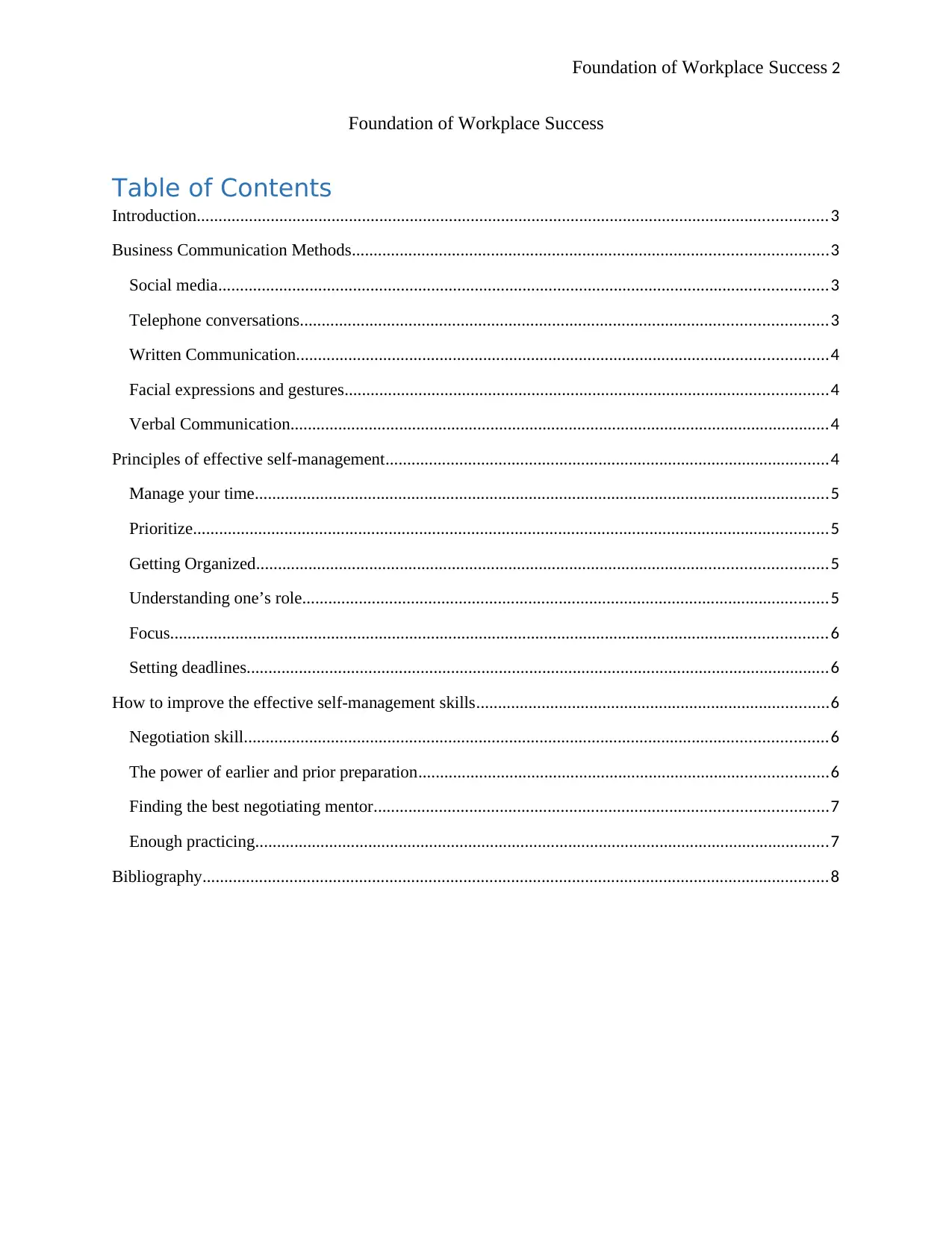
Foundation of Workplace Success 2
Foundation of Workplace Success
Table of Contents
Introduction.................................................................................................................................................3
Business Communication Methods.............................................................................................................3
Social media............................................................................................................................................3
Telephone conversations.........................................................................................................................3
Written Communication..........................................................................................................................4
Facial expressions and gestures...............................................................................................................4
Verbal Communication............................................................................................................................4
Principles of effective self-management......................................................................................................4
Manage your time....................................................................................................................................5
Prioritize..................................................................................................................................................5
Getting Organized...................................................................................................................................5
Understanding one’s role.........................................................................................................................5
Focus.......................................................................................................................................................6
Setting deadlines......................................................................................................................................6
How to improve the effective self-management skills.................................................................................6
Negotiation skill......................................................................................................................................6
The power of earlier and prior preparation..............................................................................................6
Finding the best negotiating mentor........................................................................................................7
Enough practicing....................................................................................................................................7
Bibliography................................................................................................................................................8
Foundation of Workplace Success
Table of Contents
Introduction.................................................................................................................................................3
Business Communication Methods.............................................................................................................3
Social media............................................................................................................................................3
Telephone conversations.........................................................................................................................3
Written Communication..........................................................................................................................4
Facial expressions and gestures...............................................................................................................4
Verbal Communication............................................................................................................................4
Principles of effective self-management......................................................................................................4
Manage your time....................................................................................................................................5
Prioritize..................................................................................................................................................5
Getting Organized...................................................................................................................................5
Understanding one’s role.........................................................................................................................5
Focus.......................................................................................................................................................6
Setting deadlines......................................................................................................................................6
How to improve the effective self-management skills.................................................................................6
Negotiation skill......................................................................................................................................6
The power of earlier and prior preparation..............................................................................................6
Finding the best negotiating mentor........................................................................................................7
Enough practicing....................................................................................................................................7
Bibliography................................................................................................................................................8
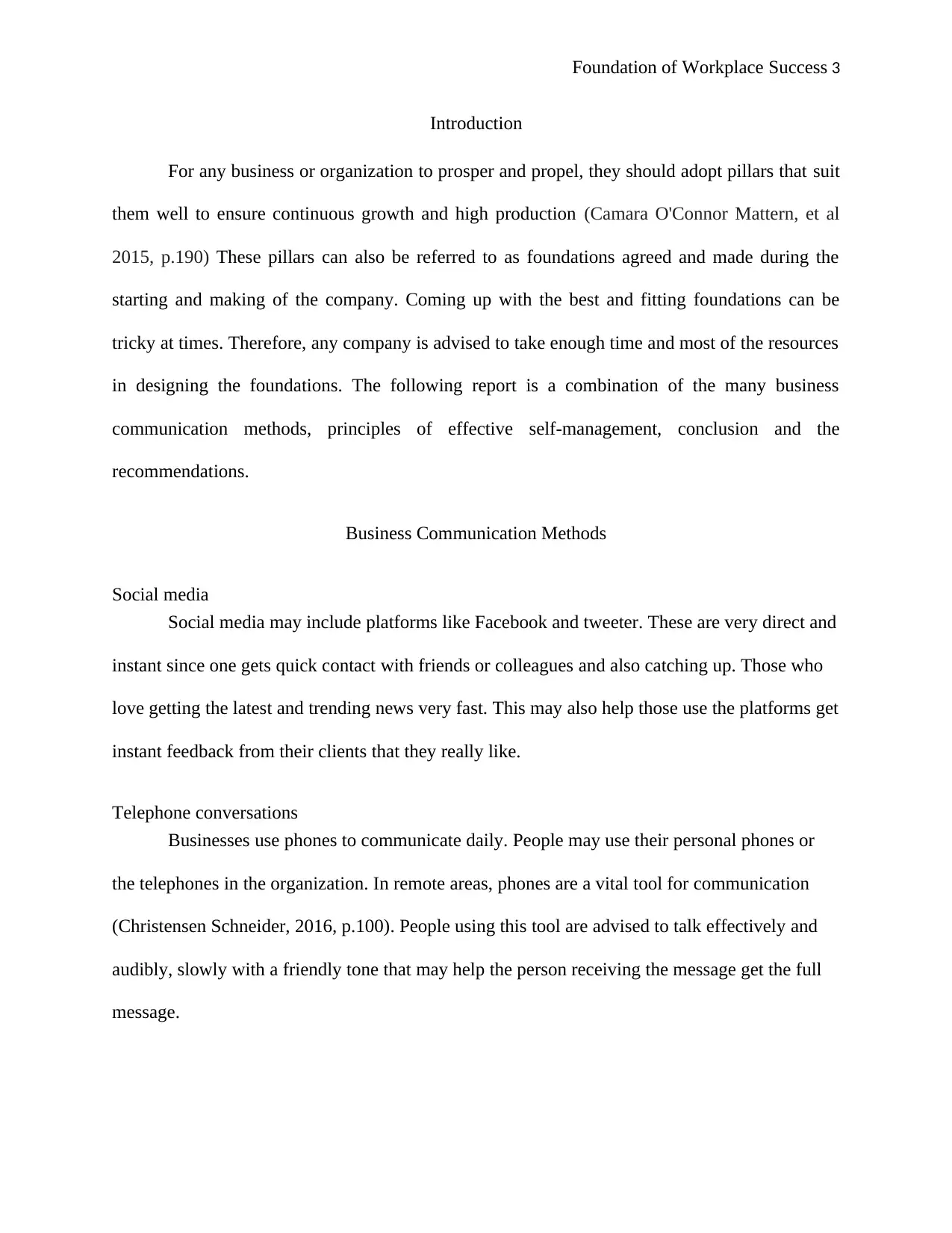
Foundation of Workplace Success 3
Introduction
For any business or organization to prosper and propel, they should adopt pillars that suit
them well to ensure continuous growth and high production (Camara O'Connor Mattern, et al
2015, p.190) These pillars can also be referred to as foundations agreed and made during the
starting and making of the company. Coming up with the best and fitting foundations can be
tricky at times. Therefore, any company is advised to take enough time and most of the resources
in designing the foundations. The following report is a combination of the many business
communication methods, principles of effective self-management, conclusion and the
recommendations.
Business Communication Methods
Social media
Social media may include platforms like Facebook and tweeter. These are very direct and
instant since one gets quick contact with friends or colleagues and also catching up. Those who
love getting the latest and trending news very fast. This may also help those use the platforms get
instant feedback from their clients that they really like.
Telephone conversations
Businesses use phones to communicate daily. People may use their personal phones or
the telephones in the organization. In remote areas, phones are a vital tool for communication
(Christensen Schneider, 2016, p.100). People using this tool are advised to talk effectively and
audibly, slowly with a friendly tone that may help the person receiving the message get the full
message.
Introduction
For any business or organization to prosper and propel, they should adopt pillars that suit
them well to ensure continuous growth and high production (Camara O'Connor Mattern, et al
2015, p.190) These pillars can also be referred to as foundations agreed and made during the
starting and making of the company. Coming up with the best and fitting foundations can be
tricky at times. Therefore, any company is advised to take enough time and most of the resources
in designing the foundations. The following report is a combination of the many business
communication methods, principles of effective self-management, conclusion and the
recommendations.
Business Communication Methods
Social media
Social media may include platforms like Facebook and tweeter. These are very direct and
instant since one gets quick contact with friends or colleagues and also catching up. Those who
love getting the latest and trending news very fast. This may also help those use the platforms get
instant feedback from their clients that they really like.
Telephone conversations
Businesses use phones to communicate daily. People may use their personal phones or
the telephones in the organization. In remote areas, phones are a vital tool for communication
(Christensen Schneider, 2016, p.100). People using this tool are advised to talk effectively and
audibly, slowly with a friendly tone that may help the person receiving the message get the full
message.
⊘ This is a preview!⊘
Do you want full access?
Subscribe today to unlock all pages.

Trusted by 1+ million students worldwide
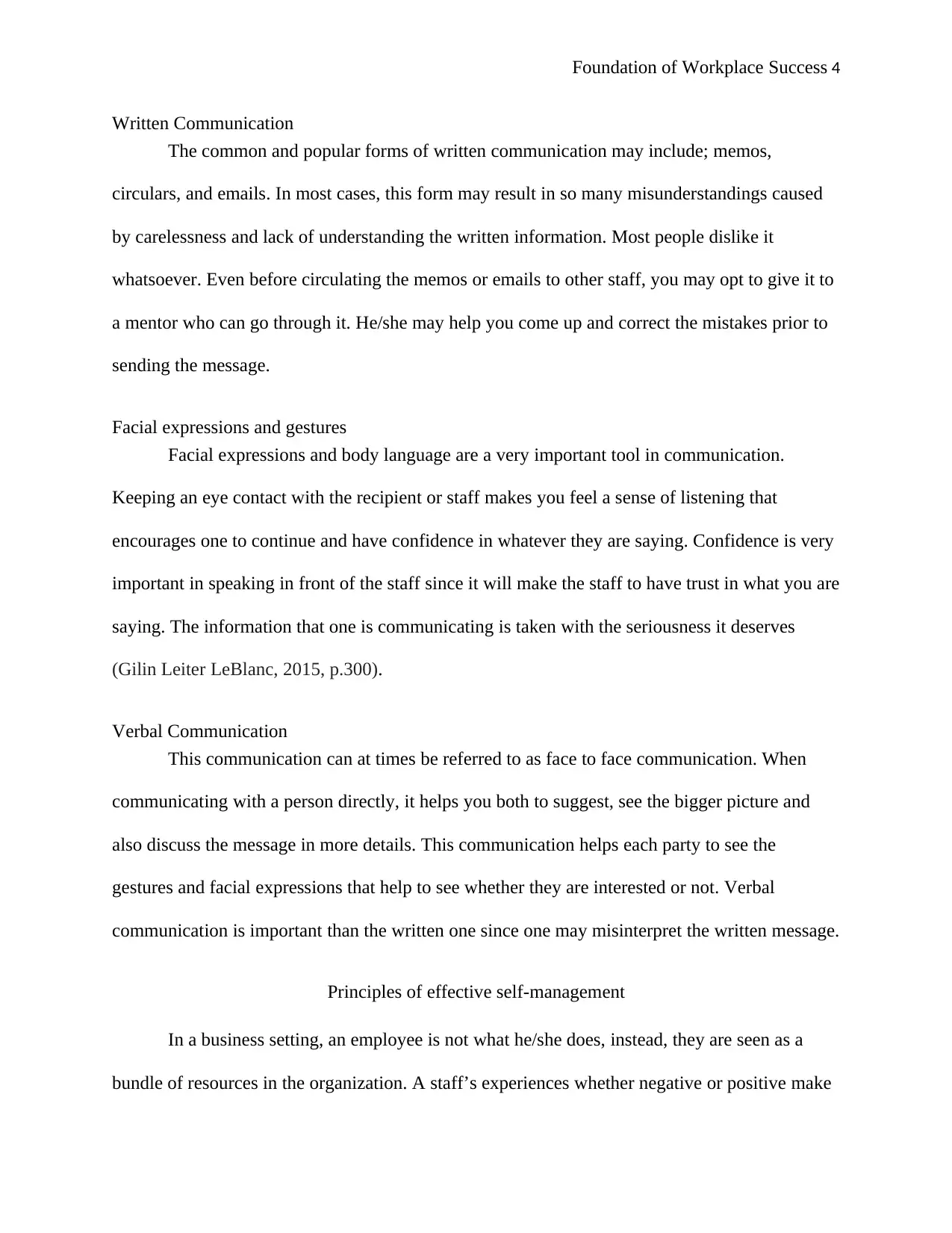
Foundation of Workplace Success 4
Written Communication
The common and popular forms of written communication may include; memos,
circulars, and emails. In most cases, this form may result in so many misunderstandings caused
by carelessness and lack of understanding the written information. Most people dislike it
whatsoever. Even before circulating the memos or emails to other staff, you may opt to give it to
a mentor who can go through it. He/she may help you come up and correct the mistakes prior to
sending the message.
Facial expressions and gestures
Facial expressions and body language are a very important tool in communication.
Keeping an eye contact with the recipient or staff makes you feel a sense of listening that
encourages one to continue and have confidence in whatever they are saying. Confidence is very
important in speaking in front of the staff since it will make the staff to have trust in what you are
saying. The information that one is communicating is taken with the seriousness it deserves
(Gilin Leiter LeBlanc, 2015, p.300).
Verbal Communication
This communication can at times be referred to as face to face communication. When
communicating with a person directly, it helps you both to suggest, see the bigger picture and
also discuss the message in more details. This communication helps each party to see the
gestures and facial expressions that help to see whether they are interested or not. Verbal
communication is important than the written one since one may misinterpret the written message.
Principles of effective self-management
In a business setting, an employee is not what he/she does, instead, they are seen as a
bundle of resources in the organization. A staff’s experiences whether negative or positive make
Written Communication
The common and popular forms of written communication may include; memos,
circulars, and emails. In most cases, this form may result in so many misunderstandings caused
by carelessness and lack of understanding the written information. Most people dislike it
whatsoever. Even before circulating the memos or emails to other staff, you may opt to give it to
a mentor who can go through it. He/she may help you come up and correct the mistakes prior to
sending the message.
Facial expressions and gestures
Facial expressions and body language are a very important tool in communication.
Keeping an eye contact with the recipient or staff makes you feel a sense of listening that
encourages one to continue and have confidence in whatever they are saying. Confidence is very
important in speaking in front of the staff since it will make the staff to have trust in what you are
saying. The information that one is communicating is taken with the seriousness it deserves
(Gilin Leiter LeBlanc, 2015, p.300).
Verbal Communication
This communication can at times be referred to as face to face communication. When
communicating with a person directly, it helps you both to suggest, see the bigger picture and
also discuss the message in more details. This communication helps each party to see the
gestures and facial expressions that help to see whether they are interested or not. Verbal
communication is important than the written one since one may misinterpret the written message.
Principles of effective self-management
In a business setting, an employee is not what he/she does, instead, they are seen as a
bundle of resources in the organization. A staff’s experiences whether negative or positive make
Paraphrase This Document
Need a fresh take? Get an instant paraphrase of this document with our AI Paraphraser
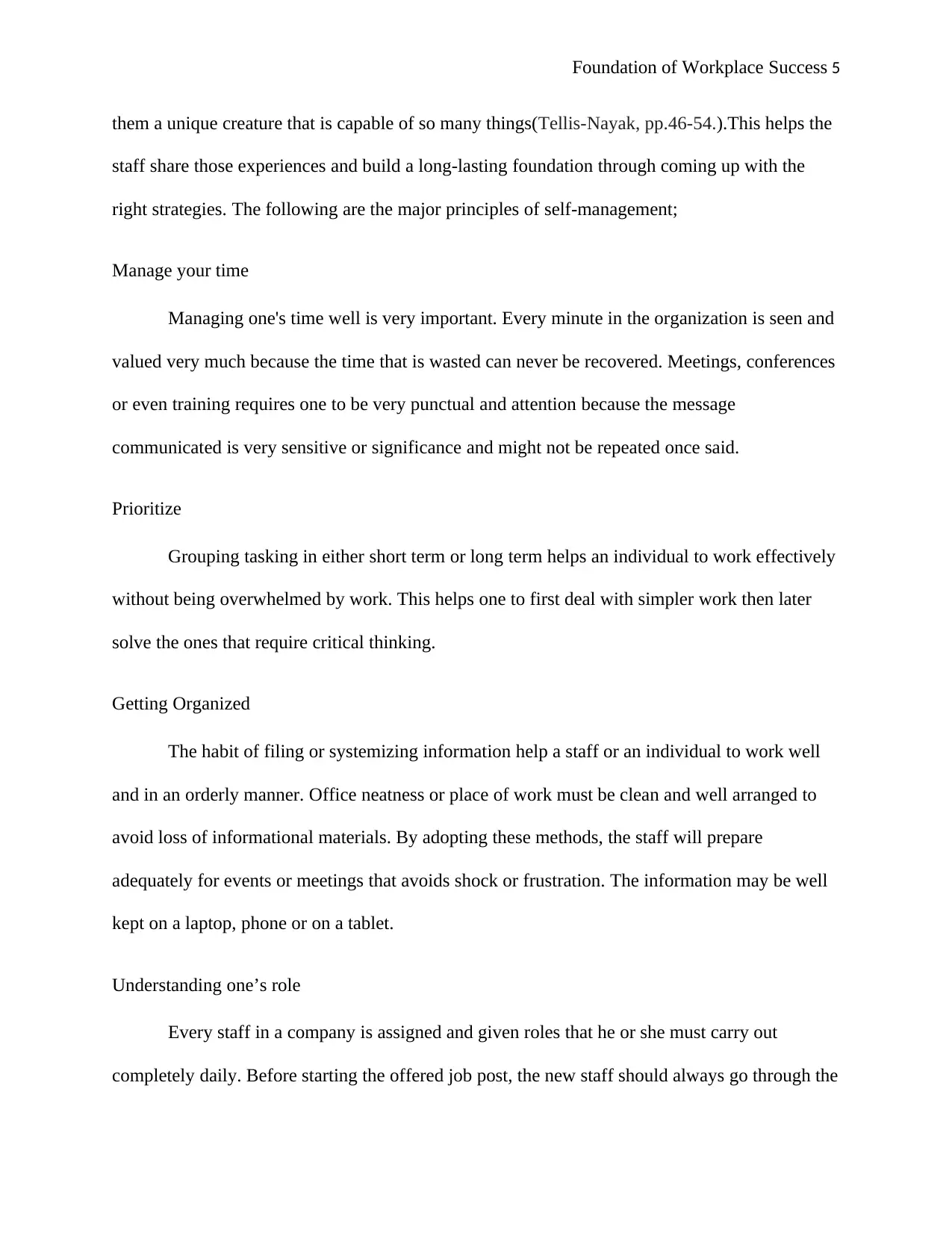
Foundation of Workplace Success 5
them a unique creature that is capable of so many things(Tellis-Nayak, pp.46-54.).This helps the
staff share those experiences and build a long-lasting foundation through coming up with the
right strategies. The following are the major principles of self-management;
Manage your time
Managing one's time well is very important. Every minute in the organization is seen and
valued very much because the time that is wasted can never be recovered. Meetings, conferences
or even training requires one to be very punctual and attention because the message
communicated is very sensitive or significance and might not be repeated once said.
Prioritize
Grouping tasking in either short term or long term helps an individual to work effectively
without being overwhelmed by work. This helps one to first deal with simpler work then later
solve the ones that require critical thinking.
Getting Organized
The habit of filing or systemizing information help a staff or an individual to work well
and in an orderly manner. Office neatness or place of work must be clean and well arranged to
avoid loss of informational materials. By adopting these methods, the staff will prepare
adequately for events or meetings that avoids shock or frustration. The information may be well
kept on a laptop, phone or on a tablet.
Understanding one’s role
Every staff in a company is assigned and given roles that he or she must carry out
completely daily. Before starting the offered job post, the new staff should always go through the
them a unique creature that is capable of so many things(Tellis-Nayak, pp.46-54.).This helps the
staff share those experiences and build a long-lasting foundation through coming up with the
right strategies. The following are the major principles of self-management;
Manage your time
Managing one's time well is very important. Every minute in the organization is seen and
valued very much because the time that is wasted can never be recovered. Meetings, conferences
or even training requires one to be very punctual and attention because the message
communicated is very sensitive or significance and might not be repeated once said.
Prioritize
Grouping tasking in either short term or long term helps an individual to work effectively
without being overwhelmed by work. This helps one to first deal with simpler work then later
solve the ones that require critical thinking.
Getting Organized
The habit of filing or systemizing information help a staff or an individual to work well
and in an orderly manner. Office neatness or place of work must be clean and well arranged to
avoid loss of informational materials. By adopting these methods, the staff will prepare
adequately for events or meetings that avoids shock or frustration. The information may be well
kept on a laptop, phone or on a tablet.
Understanding one’s role
Every staff in a company is assigned and given roles that he or she must carry out
completely daily. Before starting the offered job post, the new staff should always go through the
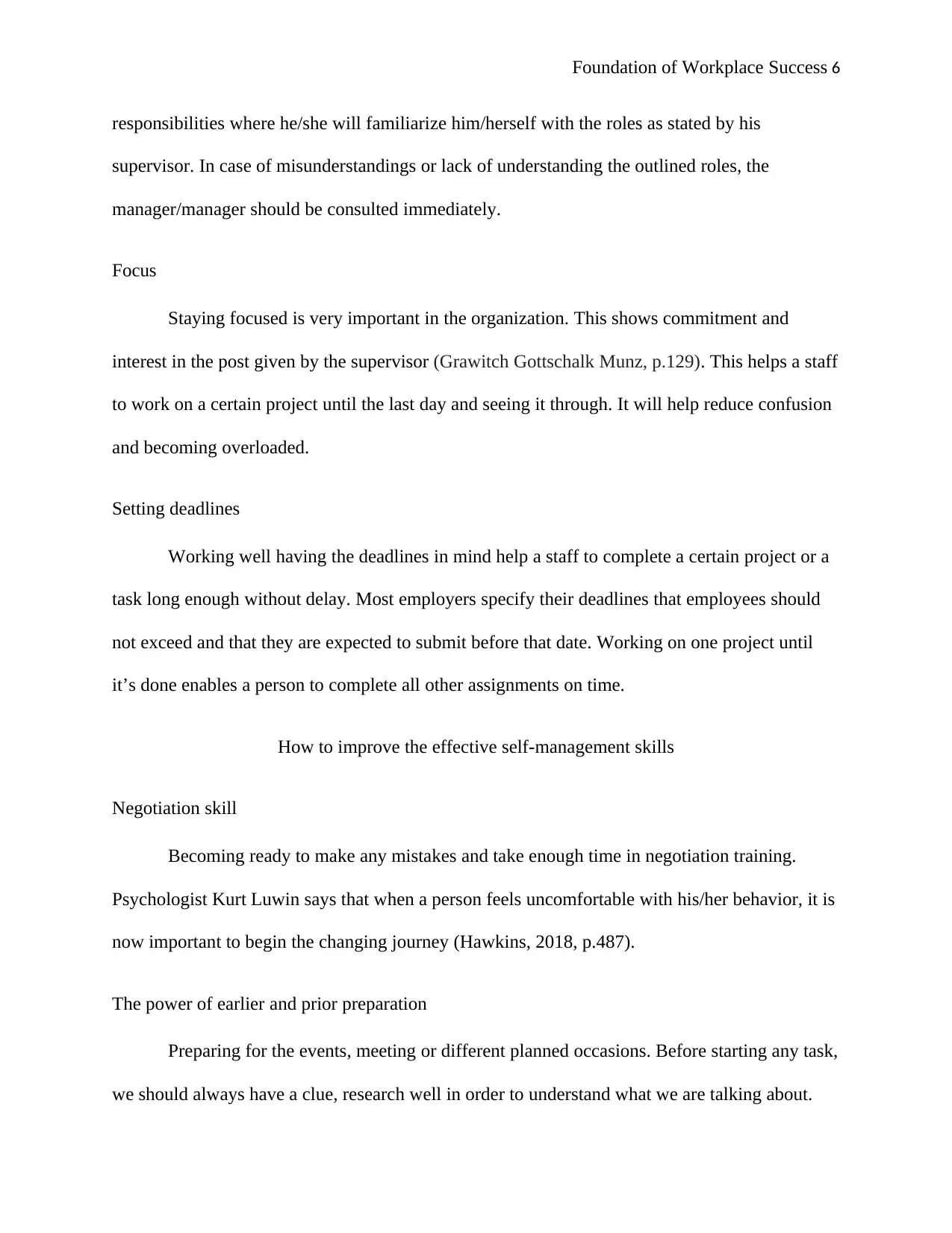
Foundation of Workplace Success 6
responsibilities where he/she will familiarize him/herself with the roles as stated by his
supervisor. In case of misunderstandings or lack of understanding the outlined roles, the
manager/manager should be consulted immediately.
Focus
Staying focused is very important in the organization. This shows commitment and
interest in the post given by the supervisor (Grawitch Gottschalk Munz, p.129). This helps a staff
to work on a certain project until the last day and seeing it through. It will help reduce confusion
and becoming overloaded.
Setting deadlines
Working well having the deadlines in mind help a staff to complete a certain project or a
task long enough without delay. Most employers specify their deadlines that employees should
not exceed and that they are expected to submit before that date. Working on one project until
it’s done enables a person to complete all other assignments on time.
How to improve the effective self-management skills
Negotiation skill
Becoming ready to make any mistakes and take enough time in negotiation training.
Psychologist Kurt Luwin says that when a person feels uncomfortable with his/her behavior, it is
now important to begin the changing journey (Hawkins, 2018, p.487).
The power of earlier and prior preparation
Preparing for the events, meeting or different planned occasions. Before starting any task,
we should always have a clue, research well in order to understand what we are talking about.
responsibilities where he/she will familiarize him/herself with the roles as stated by his
supervisor. In case of misunderstandings or lack of understanding the outlined roles, the
manager/manager should be consulted immediately.
Focus
Staying focused is very important in the organization. This shows commitment and
interest in the post given by the supervisor (Grawitch Gottschalk Munz, p.129). This helps a staff
to work on a certain project until the last day and seeing it through. It will help reduce confusion
and becoming overloaded.
Setting deadlines
Working well having the deadlines in mind help a staff to complete a certain project or a
task long enough without delay. Most employers specify their deadlines that employees should
not exceed and that they are expected to submit before that date. Working on one project until
it’s done enables a person to complete all other assignments on time.
How to improve the effective self-management skills
Negotiation skill
Becoming ready to make any mistakes and take enough time in negotiation training.
Psychologist Kurt Luwin says that when a person feels uncomfortable with his/her behavior, it is
now important to begin the changing journey (Hawkins, 2018, p.487).
The power of earlier and prior preparation
Preparing for the events, meeting or different planned occasions. Before starting any task,
we should always have a clue, research well in order to understand what we are talking about.
⊘ This is a preview!⊘
Do you want full access?
Subscribe today to unlock all pages.

Trusted by 1+ million students worldwide
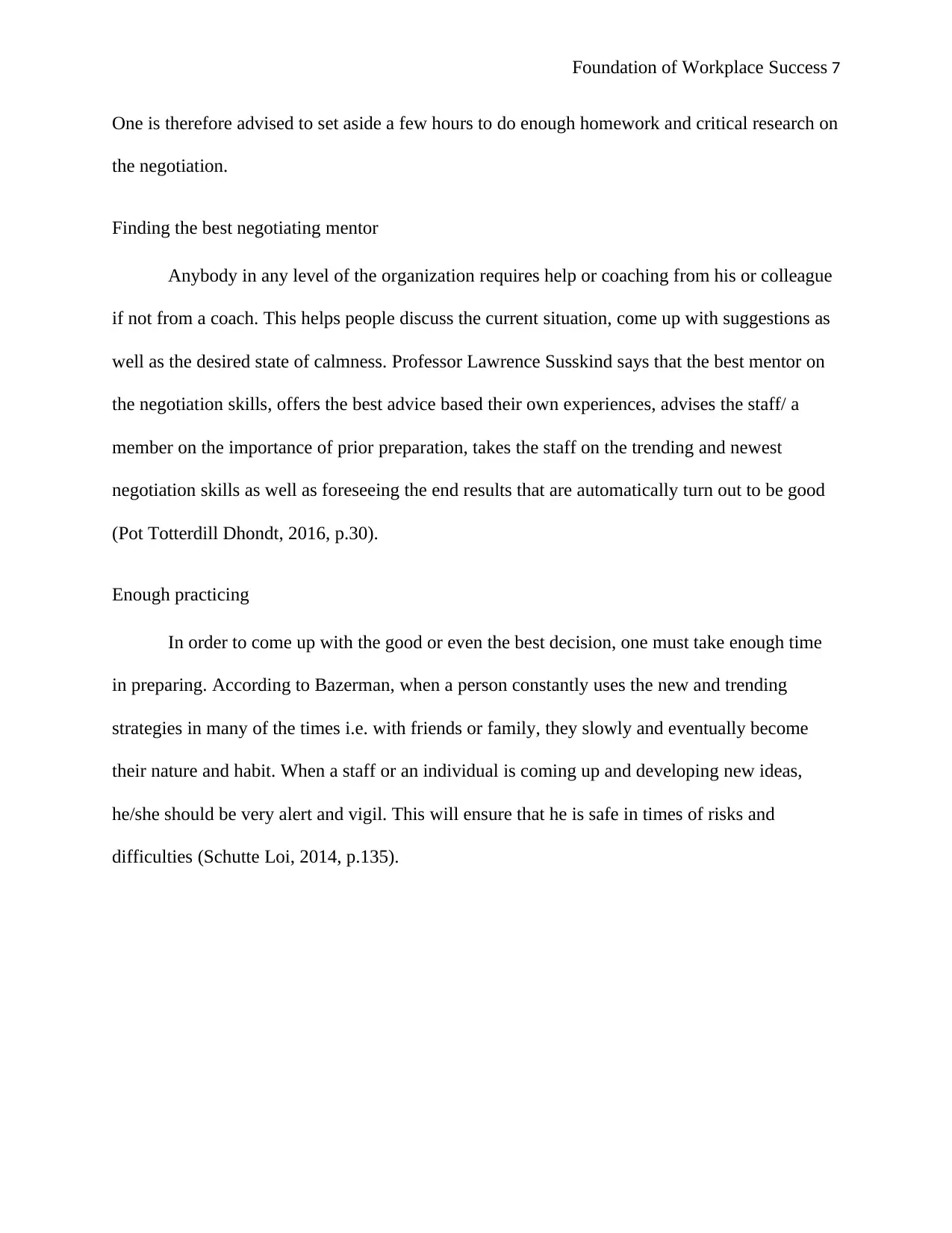
Foundation of Workplace Success 7
One is therefore advised to set aside a few hours to do enough homework and critical research on
the negotiation.
Finding the best negotiating mentor
Anybody in any level of the organization requires help or coaching from his or colleague
if not from a coach. This helps people discuss the current situation, come up with suggestions as
well as the desired state of calmness. Professor Lawrence Susskind says that the best mentor on
the negotiation skills, offers the best advice based their own experiences, advises the staff/ a
member on the importance of prior preparation, takes the staff on the trending and newest
negotiation skills as well as foreseeing the end results that are automatically turn out to be good
(Pot Totterdill Dhondt, 2016, p.30).
Enough practicing
In order to come up with the good or even the best decision, one must take enough time
in preparing. According to Bazerman, when a person constantly uses the new and trending
strategies in many of the times i.e. with friends or family, they slowly and eventually become
their nature and habit. When a staff or an individual is coming up and developing new ideas,
he/she should be very alert and vigil. This will ensure that he is safe in times of risks and
difficulties (Schutte Loi, 2014, p.135).
One is therefore advised to set aside a few hours to do enough homework and critical research on
the negotiation.
Finding the best negotiating mentor
Anybody in any level of the organization requires help or coaching from his or colleague
if not from a coach. This helps people discuss the current situation, come up with suggestions as
well as the desired state of calmness. Professor Lawrence Susskind says that the best mentor on
the negotiation skills, offers the best advice based their own experiences, advises the staff/ a
member on the importance of prior preparation, takes the staff on the trending and newest
negotiation skills as well as foreseeing the end results that are automatically turn out to be good
(Pot Totterdill Dhondt, 2016, p.30).
Enough practicing
In order to come up with the good or even the best decision, one must take enough time
in preparing. According to Bazerman, when a person constantly uses the new and trending
strategies in many of the times i.e. with friends or family, they slowly and eventually become
their nature and habit. When a staff or an individual is coming up and developing new ideas,
he/she should be very alert and vigil. This will ensure that he is safe in times of risks and
difficulties (Schutte Loi, 2014, p.135).
Paraphrase This Document
Need a fresh take? Get an instant paraphrase of this document with our AI Paraphraser
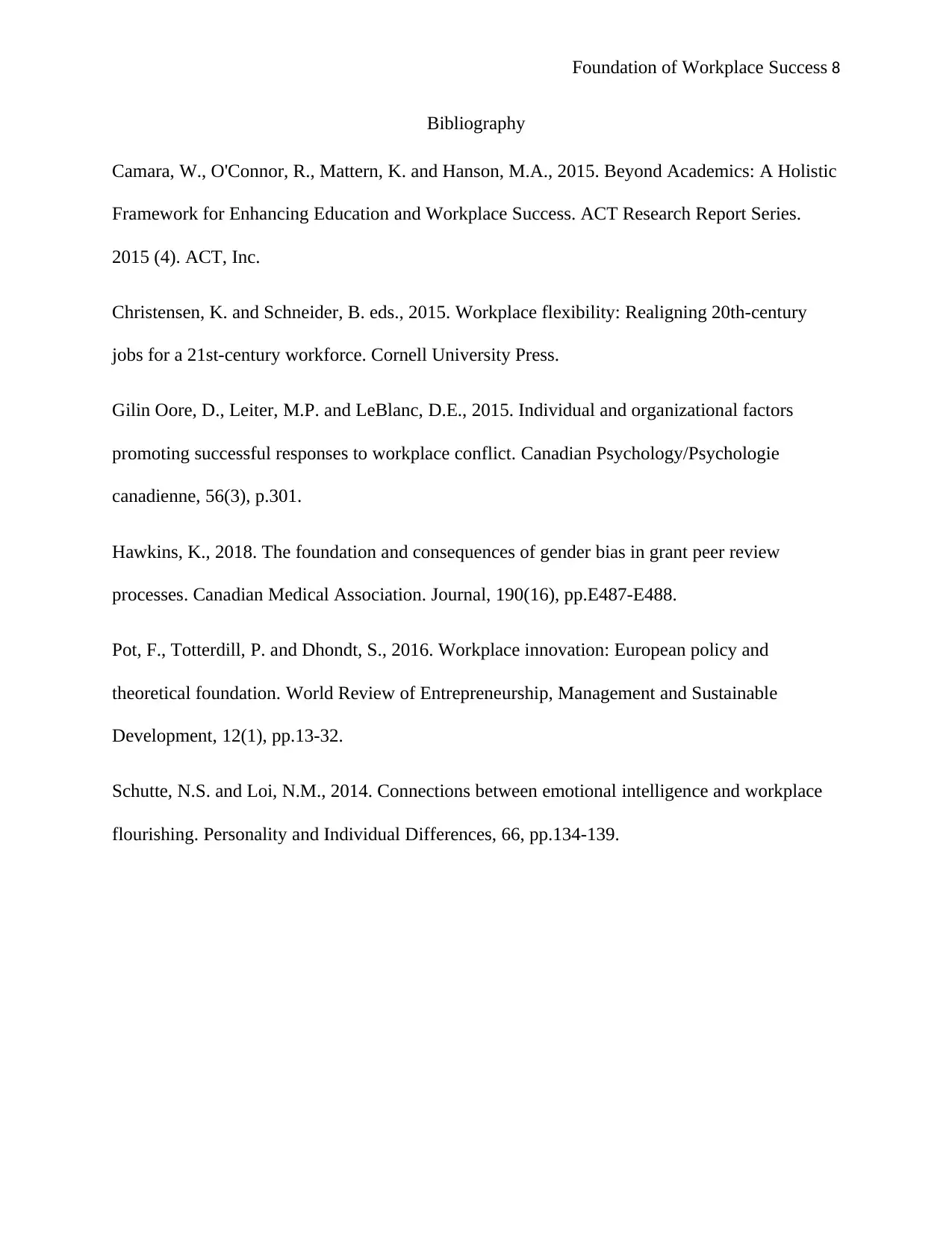
Foundation of Workplace Success 8
Bibliography
Camara, W., O'Connor, R., Mattern, K. and Hanson, M.A., 2015. Beyond Academics: A Holistic
Framework for Enhancing Education and Workplace Success. ACT Research Report Series.
2015 (4). ACT, Inc.
Christensen, K. and Schneider, B. eds., 2015. Workplace flexibility: Realigning 20th-century
jobs for a 21st-century workforce. Cornell University Press.
Gilin Oore, D., Leiter, M.P. and LeBlanc, D.E., 2015. Individual and organizational factors
promoting successful responses to workplace conflict. Canadian Psychology/Psychologie
canadienne, 56(3), p.301.
Hawkins, K., 2018. The foundation and consequences of gender bias in grant peer review
processes. Canadian Medical Association. Journal, 190(16), pp.E487-E488.
Pot, F., Totterdill, P. and Dhondt, S., 2016. Workplace innovation: European policy and
theoretical foundation. World Review of Entrepreneurship, Management and Sustainable
Development, 12(1), pp.13-32.
Schutte, N.S. and Loi, N.M., 2014. Connections between emotional intelligence and workplace
flourishing. Personality and Individual Differences, 66, pp.134-139.
Bibliography
Camara, W., O'Connor, R., Mattern, K. and Hanson, M.A., 2015. Beyond Academics: A Holistic
Framework for Enhancing Education and Workplace Success. ACT Research Report Series.
2015 (4). ACT, Inc.
Christensen, K. and Schneider, B. eds., 2015. Workplace flexibility: Realigning 20th-century
jobs for a 21st-century workforce. Cornell University Press.
Gilin Oore, D., Leiter, M.P. and LeBlanc, D.E., 2015. Individual and organizational factors
promoting successful responses to workplace conflict. Canadian Psychology/Psychologie
canadienne, 56(3), p.301.
Hawkins, K., 2018. The foundation and consequences of gender bias in grant peer review
processes. Canadian Medical Association. Journal, 190(16), pp.E487-E488.
Pot, F., Totterdill, P. and Dhondt, S., 2016. Workplace innovation: European policy and
theoretical foundation. World Review of Entrepreneurship, Management and Sustainable
Development, 12(1), pp.13-32.
Schutte, N.S. and Loi, N.M., 2014. Connections between emotional intelligence and workplace
flourishing. Personality and Individual Differences, 66, pp.134-139.
1 out of 8
Related Documents
Your All-in-One AI-Powered Toolkit for Academic Success.
+13062052269
info@desklib.com
Available 24*7 on WhatsApp / Email
![[object Object]](/_next/static/media/star-bottom.7253800d.svg)
Unlock your academic potential
Copyright © 2020–2025 A2Z Services. All Rights Reserved. Developed and managed by ZUCOL.




